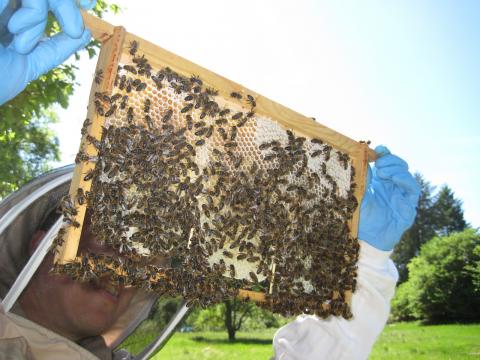Submitted by mrichar1 on Fri, 04/09/2021 - 10:40

I'd been advised against letting the bees draw their own comb for many years, having always been advised to use foundation wax in my frames.
The arguments were many...
* Without a 'guide' they'll build comb in all directions and glue everything together
* They'll make too much drone brood.
* Foundation gives them a head-start.
Submitted by mrichar1 on Thu, 03/26/2020 - 10:45
with apologies to Gabriel García Márquez...
A lot of people have been asking me about what is going to happen to the bees during the current lockdown during the COVID-19 outbreak, so I thought I'd write a quick post highlighting what the bees, and us beekeepers will be doing over the next few weeks and months.
Submitted by mrichar1 on Fri, 09/07/2018 - 12:02
Whenever you mention to anyone that you keep bees, their first question is usually "'can I buy some honey?", swiftly followed (when you have none available) by "what honey should I buy?"
There's actually a lot behind this relatively simple question, and I thought I'd try today to talk through some of the aspects, issues and pitfalls of buying honey to help answer this question in as much detail as I can!
Country of Origin
There are 3 choices here:
Submitted by mrichar1 on Sun, 05/13/2018 - 22:53
The Scottish Native Honey Bee Society is currently carrying out a survey looking for native bee populations still extant in Scotland.This is valuable work, seeking to improve the quality of bees available in Scotland and the UK, and try to avoid some of the issues that can occur using imported bees, such as being unsuited to local conditions, hybridisation, and the risk of the importation of new pests and diseases to the UK from elsewhere.
Submitted by mrichar1 on Tue, 05/08/2018 - 14:37
On Monday we were happy to host Ben Moore from Ben's Bees at the apiary at Kings' Buildings.
Ben is an Australian beekeeper who is travelling around Europe, visiting beekeepers and those involved with honey bees, making new contacts, collecting information, and learning as much as possible about different approaches to beekeeping across the world.
Submitted by mrichar1 on Tue, 02/20/2018 - 12:51
There is a lot of information about feeding bees available - after all, starvation is one of the biggest killers of bees through the winter months. Almost all beekeepers would agree that it is (sometimes) necessary to feed bees thick syrup (2 parts sugar, 1 part water) and/or hard candy or fondant in late Autumn, to boost the stores already laid down and see them through to the spring.
Submitted by mrichar1 on Mon, 04/10/2017 - 12:02
We monitor our hives for varroa several times each year, and treat as appropriate, depending on the level of infestation, and the time of year - part of our Integrated Pest Management (IPM) approach.
Submitted by mrichar1 on Wed, 01/11/2017 - 16:27
The EMBA beginners' beekeeping course is once again open for bookings. We are pleased to be involved once more as a site for practical tuition for these courses, and encourage any university staff or students who are interested in taking up beekeeping to take this very worthwhile course.
Submitted by mrichar1 on Sat, 01/07/2017 - 16:13
We usually try to avoid opening our hives at all during winter. this is because the bees ahve done their best to seal up the hives and settle down, and any disturbances are likely to be to their detriment. However there are times when winter visits are necessary.
Today we made a quick visit to check on the food stores in the hives. A poor summer meant less honey stores in the hives, and a very mild Autumn and winter means the bees will have been more active - and active bees consume more food.
Submitted by mrichar1 on Fri, 05/20/2016 - 00:00
We were involved in helping with beekeeping training courses for staff and students at the Roslin Institute (Easter Bush Campus) in May. Full details from the Roslin Reporter.
Pages